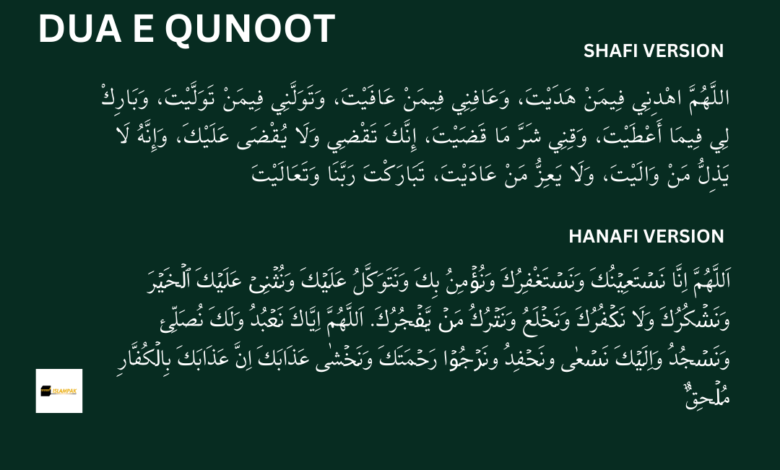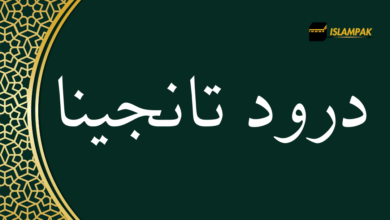Dua e Qunoot: Full Arabic Text, English Translation (Hanafi & Shafi)

Dua e Qunoot holds a special place in Islamic prayers, particularly during the Witr prayer. This is a powerful way to seek Allah’s guidance, mercy, and protection. In this article, we’ll explore its meaning, Arabic text, translations (English/Urdu), and practical tips to recite it authentically.
What is Dua e Qunoot?
Dua e Qunoot (دعاء قنوت) is a supplication recited in the final rak’ah of the Witr prayer, an essential part of the nightly Isha prayers. Derived from the Arabic word Qunoot (devotion), it symbolizes humility and complete submission to Allah. Many Muslims also recite it during times of hardship or in special prayers like those in Shaban or Ramadan.
The Authentic Dua e Qunoot (Shafi Version)
While slight variations exist among Islamic schools (Hanafi, Shafi’i), the most widely accepted version is:
Dua e Qunoot in Arabic Text (shafi)
اللَّهُمَّ اهْدِنِي فِيمَنْ هَدَيْتَ، وَعَافِنِي فِيمَنْ عَافَيْتَ، وَتَوَلَّنِي فِيمَنْ تَوَلَّيْتَ، وَبَارِكْ لِي فِيمَا أَعْطَيْتَ، وَقِنِي شَرَّ مَا قَضَيْتَ، إِنَّكَ تَقْضِي وَلَا يُقْضَى عَلَيْكَ، وَإِنَّهُ لَا يَذِلُّ مَنْ وَالَيْتَ، وَلَا يَعِزُّ مَنْ عَادَيْتَ، تَبَارَكْتَ رَبَّنَا وَتَعَالَيْتَ
English Translation of Dua e Kunoot (shafi)
“O Allah, guide me among those You have guided, pardon me among those You have pardoned, befriend me among those You have befriended, bless me in what You have granted, and protect me from the evil You have decreed. You decree, and none can decree over You. Indeed, he is not humiliated whom You have befriended, nor is he honored who is Your enemy. Blessed are You, our Lord, and Exalted.”
Dua e Qunoot Urdu Translation (shafi)
“اے اللہ، تو مجھے ان لوگوں میں ہدایت دے جنہیں تو نے ہدایت دی، مجھے ان میں صحت دے جنہیں تو نے صحت دی، میری دوستی ان سے کر جو تیری دوستی رکھتے ہیں، جو کچھ تو نے مجھے دیا ہے اس میں برکت عطا فرما، اور مجھے اس برائی سے بچا جو تو نے مقدر کی۔ بے شک تو فیصلہ کرتا ہے اور تیرے خلاف کوئی فیصلہ نہیں کیا جا سکتا۔ جسے تو دوست رکھے وہ ذلیل نہیں ہوتا، اور جس سے تو دشمنی رکھے وہ عزت نہیں پاتا۔ اے ہمارے رب، تو بابرکت اور بلند ہے۔”
Transliteration in Roman English (shafi)
Allahummahdini feeman hadayt, wa ‘afini feeman ‘afayt, wa tawallani feeman tawallayt, wa barik li feema a’tayt, wa qini sharra ma qadayt, fa innaka taqdi wa la yuqda ‘alayk, wa innahu la yadhillu man walayt, wa la ya’izzu man ‘adayt, tabarakta Rabbana wa ta’alayt.
Dua e Qunoot Translations (Hanafi Version)
اَللَّهُمَّ اِنَّا نَسۡتَعِيۡنُكَ وَنَسۡتَغْفِرُكَ وَنُؤۡمِنُ بِكَ وَنَتَوَكَّلُ عَلَيۡكَ وَنُثۡنِىۡ عَلَيۡكَ ٱلۡخَيۡرَ وَنَشۡكُرُكَ وَلَا نَكۡفُرُكَ وَنَخۡلَعُ وَنَتۡرُكُ مَنۡ يَّفۡجُرُكَ. اَللَّهُمَّ اِيَّاكَ نَعۡبُدُ وَلَكَ نُصَلِّئ وَنَسۡجُدُ وَاِلَيۡكَ نَسۡعٰى ونَحۡفِدُ ونَرۡجُوۡا رَحۡمَتَكَ وَنَخۡشٰى عَذَابَكَ اِنَّ عَذَابَكَ بِالۡكُفَّارِ مُلۡحِقٌٌ
English Translation (Hanafi Version)
O Allah! We implore You for help and beg forgiveness of You and believe in You and rely on You and extol You and we are thankful to You and are not ungrateful to You and we alienate and forsake those who disobey You. O Allah! You alone do we worship and for You do we pray and prostrate and we betake to please You and present ourselves for the service in Your cause and we hope for Your mercy and fear Your chastisement. Undoubtedly, Your torment is going to overtake infidels O Allah!
Transliteration of Dua e kunoot (Hanafi Version)
Allah humma inna nasta-eenoka wa nastaghfiruka wa nu’minu bika wa natawakkalu alaika wa nusni alaikal khair, wa nashkuruka wala nakfuruka wa nakhla-oo wa natruku mai yafjuruka, Allah humma iyyaka na’budu wa laka nusalli wa nasjud wa ilaika nas aaa wa nahfizu wa narju rahma taka wa nakhshaa azaabaka inna azaabaka bil kuffari mulhik
When and How to Recite Dua e Qunoot
- In Witr Prayer: Recited in the third rak’ah after bowing (ruku), with hands raised in supplication.
- During Crisis: Many scholars recommend it in times of communal hardship.
- Special Occasions: Optional in prayers during Ramadan or Shaban.
Step-by-Step Guide:
- Complete the Witr prayer’s final rak’ah until ruku.
- After standing up, raise your hands and recite Dua e Qunoot.
- Conclude with Salam.
Common Questions About Dua e Qunoot
Is There a Specific Dua for Shaban?
While no unique dua is prescribed for Shaban, many Muslims intensify their worship, including reciting Dua e Qunoot in nightly prayers.
Hanafi vs. Shafi’i Differences
- Hanafi School: Emphasizes reciting Dua e Qunoot only in Witr.
- Shafi’i School: Recommends it daily in Fajr prayer during calamities.
Can I Recite It in My Language?
While Arabic is preferred, you may recite translations for better understanding.
Why Recite Dua e Qunoot?
- Strengthens connection with Allah through humility.
- Seeks protection from harm and guidance in life.
- Fulfills a Sunnah of Prophet Muhammad (PBUH).
Download Dua e Qunoot PDF
For offline access, click here to download the Arabic text, transliteration, and translations.
Final Tips for Effective Supplication
- Understand the Meaning: Reflect on each line to deepen sincerity.
- Consistency: Recite it regularly in Witr prayers.
- Teach Others: Share this dua with family to multiply rewards.
By learning Dua e Qunoot, you embrace a timeless practice of devotion. May Allah accept your prayers and grant you steadfastness!



